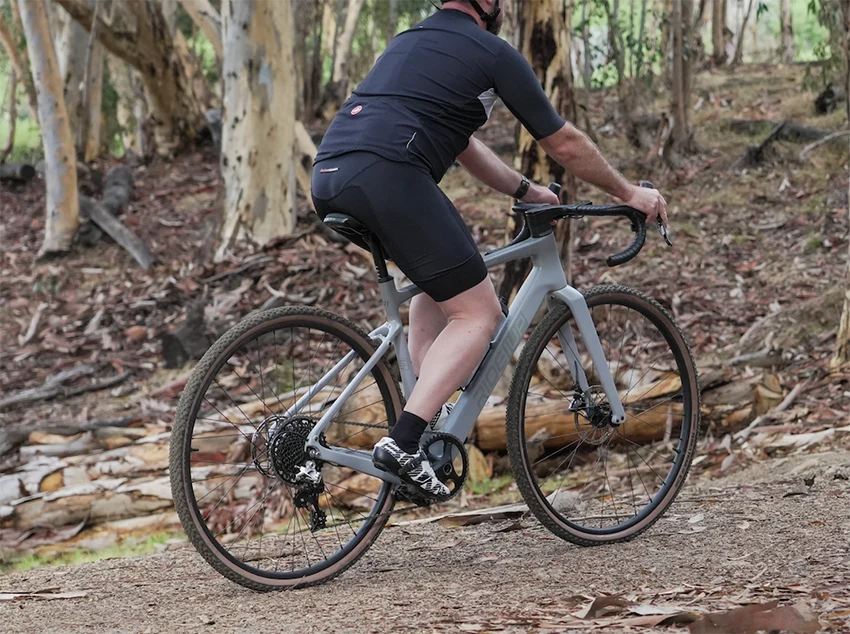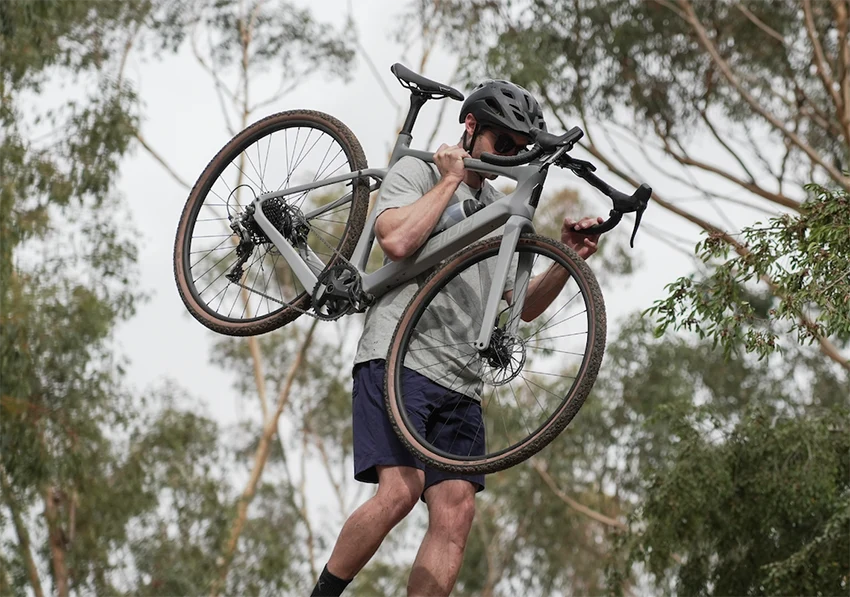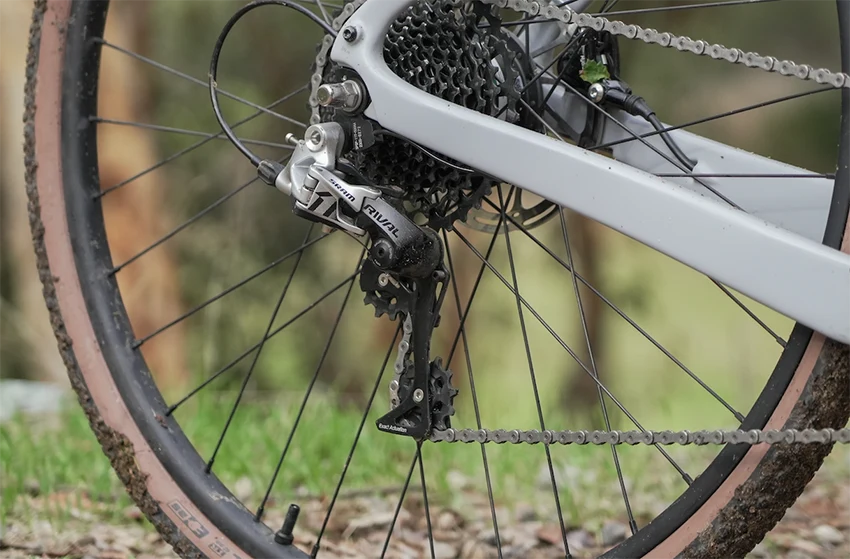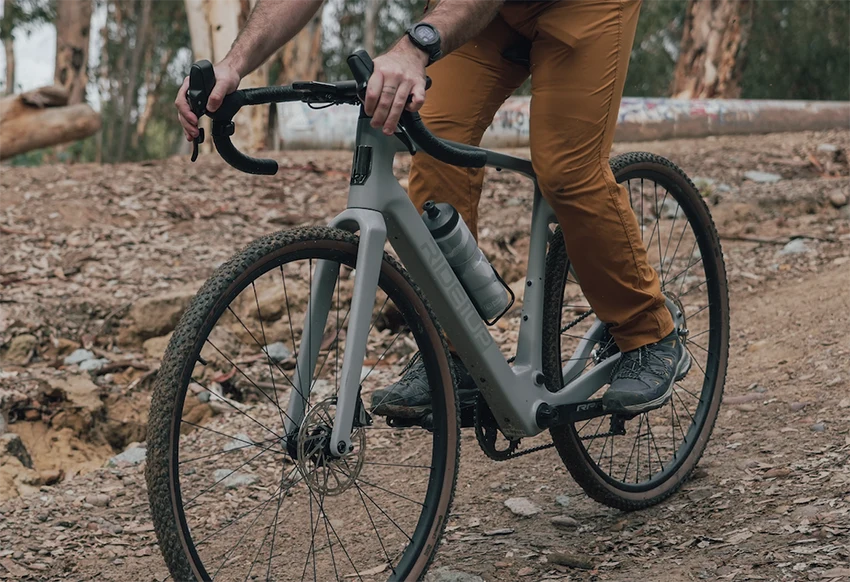Ride1UP CF Racer1: A Game-Changing Carbon Fiber Ebike at an Unbeatable Price

California-based electric bike brand Ride1UP has had a busy 2023, releasing five new bikes. The latest release is the CF Racer1, a drop-bar carbon fiber electric bike available as a road or gravel build.
Carbon fiber (CF) is a material seldom used in the entry-level e-bike market, so Ride1UP’s recent announcement has made a big splash, both in cycling media and among e-bike enthusiasts.
The company is known for making affordable, reliable e-bikes sold online, competing with other direct-to-consumer brands like Rad Power Bikes and Aventon. With this new carbon e-bike, Ride1UP seems to be taking aim at cycling’s major players like Trek, Specialized, and Cannondale.
The full price for the Ride1UP CF Racer1 will be $2,295, but it’s currently available by pre-order (shipping January 2024) at just $2,195. This price is less than half that of the next cheapest carbon fiber e-road or e-gravel bike, the Canyon Grail:ON CF 7 ($5,599).
This ‘first look’ review will examine the frame, geometry, and specs of the CF Racer1, compare the two builds, and try to find out if there’s a catch.
Overview of the Ride1UP CF Racer1

The new CF Racer1 is a big change from Ride1UP’s typical offering of aluminum-framed urban-style electric bikes. It’s also the first of this kind released by the direct-to-consumer brands that have come to dominate the e-bike space in the US.
It’s worth emphasizing that if the quality and performance of this bike hold up, the shockingly low price will change the way buyers think about carbon fiber e-bikes. Until now, they have been out of reach of most riders due to their restrictive prices, which start close to $6,000.
One CF Frame To Rule Them All

The CF Racer1 weighs only 27-28 lb, which means it’s easy to lift and carry if needed.
The Ride1UP CF Racer1 is built around a lightweight carbon fiber frame, which is available in two sizes: 50cm (rider heights from 5’3″ to 5’8″) or 56cm (5’8″ to 6’3″). Riders at the extremes of these height ranges probably won’t find the tailored fit you expect for this type of bike.
The one-piece carbon fiber aerodynamic cockpit is another impressive feature that will likely improve performance through reduced drag and improved front-end stiffness. However, it greatly limits adjustability for tailoring your bike fit.
Ride1UP’s choice to offer the bike in two sizes is a way to minimize manufacturing costs and the risk of excess stock. Road or gravel bike manufacturers typically offer between four and seven sizes. This allows riders to choose a more appropriate size and from a wider height range.
The geometry of the CF Racer1 sits somewhere between road and gravel, similar to endurance road bikes like the Cannondale Synapse or gravel/road hybrids like Specialized’s Turbo Creo.
By adding clearance for wider tires and using flared gravel bars, this versatile geometry becomes quite capable on off-road terrain. Again, by only using one frame and changing the parts, Ride1UP saves money in manufacturing costs.
Pick Your Poison: E-Road or E-Gravel
As mentioned, the CF Racer1 is available in road (27.4lb) and gravel (28.6lb) builds. The only differences between the two are the weight, the tires, and the handlebars.
The e-road bike has slick 32mm Schwalbe E-One tires and drop bars with a three-degree flare. This tire width is common for endurance-style electric road bikes and emphasizes traction and comfort with a minor reduction in efficiency. The slight flare on the bars is unusual for a road bike but isn’t enough to have a meaningful impact on performance.
The gravel model has Continental Terra Trail 40mm tubeless-ready tires with slick brown sidewalls; the rims are tubeless-compatible, requiring valves and rim tape. These high-quality gravel-specific tires greatly increase off-road capability and comfort.
Additionally, Ride1UP claims that the bike is “designed for the installation of larger tires” to increase capabilities further. The 15-degree flare on the gravel handlebars also provides extra leverage and control for off-road riding.
A Relatively Basic Build Kit Reflective of the Low Price

The SRAM Rival rear derailleur on the Ride1UP CF Racer1 is closely matched in performance to Shimano’s middle-of-the-pack 105 group.
As impressive as the carbon fiber frame, seatpost, and integrated cockpit are for a bike costing just $2,295, Ride1UP was forced to cut costs elsewhere. For us, the most notable components are the basic in-house aluminum rims and entry-level electronics that include a Bafang hub motor and cadence sensor.
Despite using these heavier aluminum rims, the CF Racer1 is lighter than several of its ‘high-end’ competitors, like Specialized’s Turbo Creo Comp ($6,500, 31.8lb).
Many higher-end carbon e-bikes have mid-drive motors and torque sensors, which provide much more intuitive, smooth, and responsive power than hub motors with cadence sensors. Nonetheless, Ride1UP is known for tuning its cadence sensors to provide better-than-average responsiveness.
It’s also worth noting that a lot of competing e-bikes use similar cadence-sensing systems, like Mahle’s X35+. The X35+ hub drive system is found on Scott’s Addict eRide 30 ($5,999), Bianchi’s Aria e-Road ($4,600), and Cannondale’s Topstone Neo SL 2 ($3,625). Of course, this system is lighter and higher quality, but the output (250W, 40Nm) is similar to the Bafang motor’s 250W and 42Nm.
Final Thoughts

While the superlatives “groundbreaking” and “revolutionary” seem hyperbolic, there’s no doubt that this small US-based manufacturer is attempting to change how ‘high-end’ designs and materials are seen in the e-bike industry.
The value of the CF Racer1 is completely unmatched, with the cheapest CF competitors coming in at almost triple the price.
All things considered, we’re very excited by this new release from Ride1UP. We’re looking forward to testing it out to see how the geometry works for pavement and off-roading and if the performance and ride quality match what we expect from carbon fiber electric road and gravel bikes.

